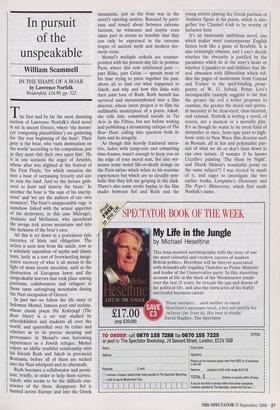In pursuit of the unspeakable
William Scammell
IN THE SHAPE OF A BOAR by Lawrence Norfolk Weidenfeld, L16.99, pp. 322 The first and by far the most daunting section of Lawrence Norfolk's third novel is set in anent Greece, where 'the heroes' (or 'competing plausibilities') are gathering for 'the true beginning of the hunt'. Their prey is the boar, who visits destruction on the world 'according to his compulsion, just as they must visit their own upon him'. He is in one scenario the anger of Artemis, whose altar was slighted at the festival of the First Fruits, 'for which omission she sent a boar of surpassing ferocity and size to ruin the land. And so the heroes gath- ered to hunt and destroy the beast.' In another the boar is 'the sum of his inscrip- tions' and 'we are the authors of our own monsters'. The boar's unappeasable rage is somehow linked with the sexual appetites of his destroyers, in this case Meleager, Atalanta and Meilanion, who spearhead the savage trek across mountains and into the darkness of the boar's cave.
All this is set down in a portentous epic narrative of hints and obliquities. The action is seen now from the inside, now as a scholarly exposition of myths and classic texts, lastly as a sort of freewheeling imagi- native recovery of what it all means in the light of more recent atrocities, such as the destruction of European Jewry and the unspeakable horrors that took place among partisans, collaborators and refugees in those same unforgiving mountains during the Nazi occupation of Greece.
In part two we follow the life story of Solomon Memel, famous poet and recluse, whose classic poem Die Keilerjagd (The Boar Hunt) is a set text studied by schoolchildren and students all over the world, and quarrelled over by critics and scholars as to its precise meaning and provenance in Memel's own harrowing experiences as a Jewish refugee. Memel enjoys an idyllic youthful relationship with his friends Ruth and Jakob in provincial Romania, before all of them are sucked into the Nazi whirlpool and its aftermath.
Ruth becomes a collaborator and prosti- tute, briefly, in order to help them survive. Jakob, who seems to be the difficult con- science of the three, disappears. Sol is hunted across Europe and into the Greek mountains, just as the boar was in the novel's opening section. Rescued by parti- sans and tossed about between extreme factions, he witnesses and maybe even takes part in events so horrible that they can only be expressed in the extreme tropes of ancient myth and modern her- metic verse.
Memel's multiple ordeals are counter- pointed with his present-day life in postwar Paris, where this now celebrated poet — part Rae, part Celan — spends most of his time trying to piece together his past, above all to find out what happened to Jakob, and why and how this links with their joint love of Ruth, Ruth herself has survived and metamorphosed into a film director, whose latest project is to film his unfilmable masterpiece of a poem. Jakob, she tells him, committed suicide in Tel Aviv in the Fifties, but not before writing . and publishing a devastating critique of The Boar Hunt, calling into question both its facts and its integrity.
As though this heavily fractured narra- tive, laden with jump-cuts and competing time-frames, wasn't enough to keep you on the edge of your moral seat, Sol also wit- nesses some weird life-or-death doings on the Paris metro which relate to his wartime experiences but which are so cloudily sym- bolic that they left me groping in the dark. There's also some erotic byplay in the film studio between Sol and Ruth and the young actress playing the Greek partisan or Atalanta figure in his poem, which is alto- gether too Channel 4-ish to be worthy of inclusion here.
It's an immensely ambitious novel, one which makes most contemporary English fiction look like a game of Scrabble. It is also irritatingly obscure, and I can't decide whether the obscurity is justified by the paradoxes which lie at the story's heart or whether it panders to and titillates that lib- eral obsession with illiberalism which rid- dles the pages of modernism from Conrad and Forster to the spell-binding prose- poetry of W. G. Sebald. Primo Levi's incomparable example suggests to me that the greater the evil a writer proposes to examine, the greater the moral and spiritu- al necessity to be clear-eyed, clear-hearted, and rational. Norfolk is writing a novel, of course, not a memoir or a morality play. It's as though he wants to be every kind of storyteller at once, from epic poet to high- brow critic to New Wave film director such as Resnais, all in hot and polymathic pur- suit of what we do or don't hunt down in our own nature. (I wonder if he knows Uccello's painting 'The Hunt by Night', and Derek Mahon's wonderful poem on the same subject?) I was riveted by much of it, and eager to investigate the two earlier books, Lempriere's Dictionary and The Pope's Rhinoceros, which first made Norfolk's name.






















































































 Previous page
Previous page